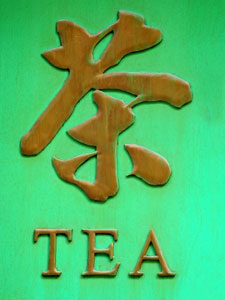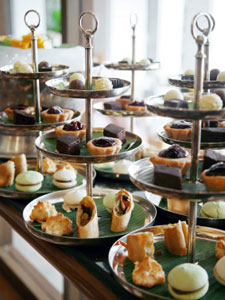Deciding who NOT to be


One of the hardest lessons to learn in business is how to pass up on opportunity. We believe intellectually that you can't be all things to all people, can't make everyone happy, and can't land every sale. At the same time, we have a terrible time saying "no" to an opportunity to make a sale or grow our businesses. An entrepreneur goes into business because he/she believes they can do something better than it's being done currently. That same confidence becomes a critical liability for any entrepreneur or business that fails to draw a hard line and decide who NOT to be.
Example #1: The Tea Shop
I've seen the inner workings of very successful, very profitable food-service operations with a strong tea theme (bistros, cafes and tea rooms). I've seen the inner workings of very successful, very profitable tea retail operations (selling packaged or bulk teas and accessories). I've yet to see anyone (including myself) manage to blend the two without dramatically sacrificing the success of one or the other (or both) parts of the business. At the end of the day, consumers don't do their Christmas shopping in a restaurant or cafe, and someone looking for a cafe or restaurant does not prefer the ambiance of a retail store. I am well aware that people have managed to create hybrid businesses that include both elements and turn a profit. At the same time, no one has been able to convince me that their business is more profitable than it would be as a more focused operation. Hybrid businesses are undoubtedly far more complex and difficult to manage.
Can you find the best meat at a butcher shop or a supermarket? Are the best wines at wine shops or liquor superstores? We shop at big-box stores for the convenience of one-stop shopping. Alternately, some people shop at the local neighborhood grocer because it's down the street from where they live. A specialty tea shop will never offer the convenience of a super store and cannot survive on local traffic alone (outside a handful of major cities). Most importantly, I have to assume that the shop that spends 100% of their time procuring and selling the finest teas will have a better selection, better product, and better trained staff than the shop that splits it's time between finger sandwiches, mopping the kitchen and selling premium Japanese Teas.
Example #2: The Online Shop
A small business is going to have a pretty difficult time beating companies like Adagio, Teavana and Englishteastore.com at their own game. These companies have large collections and move a tremendous amount of product (meaning they buy at prices you can only dream about). Sure, you can carry more teas or offer lower retail prices, but you'll have a hard time matching their efficiency and profitability. According to traffic estimates from Compete.com, these three powerhouses combined to attract nearly 220,000 UNIQUE visitors in February 2010. In comparison, even a cast of well respected tea companies like Rishi, TeaGschwendner and Harney & Sons combined to attract under 32,000 unique visitors that month.
While it may be difficult to get search engines to recognize you and convince the average tea drinker that your site is the single best place for all things tea, there is a huge opportunity to focus on a sub-set of the business and become something that these large companies cannot: niche experts. Take the examples of the butcher and wine shops above to the next level. Imagine the impact of a site dedicated to aged Pu-Erhs, Japanese Green Teas, or Taiwanese Oolongs. The opportunities abound for creating powerful visuals, telling compelling stories, and building a strong brand around a niche of the tea business.
Example #3: Wholesale
I'll be honest, the wholesale tea market in the US pains me. More than half of US wholesalers buy from other US wholesalers. Most of the big Specialty Tea companies in the US don't even buy direct from source, but rather go through brokers and resellers in other countries. The tea supply chain is an incestuous mess, and the result is that if you spend $10 each on 10 packages of tea from different vendors, you'll get anywhere from ten cents worth tea to $4 worth of tea in each package. Price and value have little relationship.
Many independent tea shops pride themselves in their shrewd purchasing skills and source from a dozen different wholesalers to get the best teas and reduce their risk and reliance on any one vendor. How shocked many of them would be to find out that in some cases the teas from half of those vendors all leave from the same warehouse - just in different "Private Labeled" boxes.
Enough ranting... back to my point... Wholesale is a bright, shiny opportunity for most small tea businesses. They are considered the experts in their local community and are surrounded by specialty shops, restaurants and cafes that express interest in buying tea wholesale. For these businesses, tea is an afterthought - a minuscule side business that is not worth spending too much time investigating sourcing options. The small retailer gets excited by the opportunity and begins the wild goose chase of meeting the needs of these small retailers. They need packaging with certain information, point of purchase displays, storage options, marketing materials, in-store signage, and training.
I've seen this story time and time again. It always takes a lot more time and money than you expect to launch a new offering. While the first few wholesale customers come on board with excitement, the sales are small and the wholesale business doesn't grow nearly as fast as you expected. It turns out that selling something you already have to someone that comes into your store is easy and profitable. Changing the way you do business to chase a small wholesale account proves painful, and distracts from your core business. Most importantly, if tea ever does become a meaningful income stream for your new customer, they will begin to investigate their options and find that you are far from the lowest cost provider and they take their business elsewhere.
For most small tea entrepreneurs (and for many larger tea companies) selling wholesale to restaurants, cafes and specialty retailers is a side business at best. Include the investment of time and the distraction from your core business and it would be wise for most tea companies to avoid wholesale altogether - or at a minimum avoid changing your product, packaging and operations to chase the opportunity. Selling to those who approach you is fine, building a wholesale sales staff and going after small and medium accounts is risky even for large tea companies.
In summary, I would encourage you to focus on what you do best. Don't get distracted by ancillary opportunities. It's hard to pass up a sale, and hard not to search for creative ways of expanding your business when times are tight. But always be cautious of any strategy that waters down who you are and what your customer sees your focus as. I don't doubt there is a market for curious and tchotchkes, but be careful lest your specialty tea shop becomes a joke.
Adagio Teas
Twitter: @AdagioRetail
